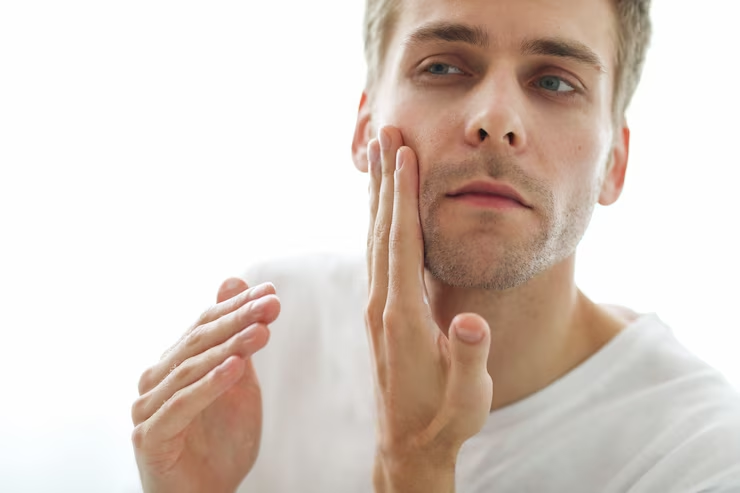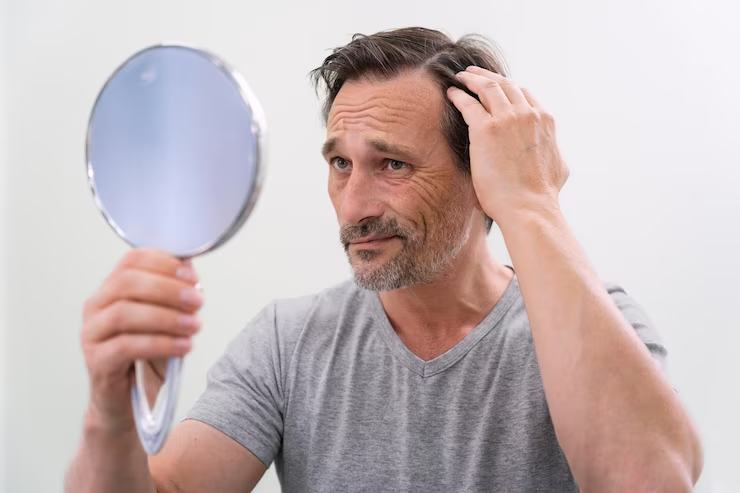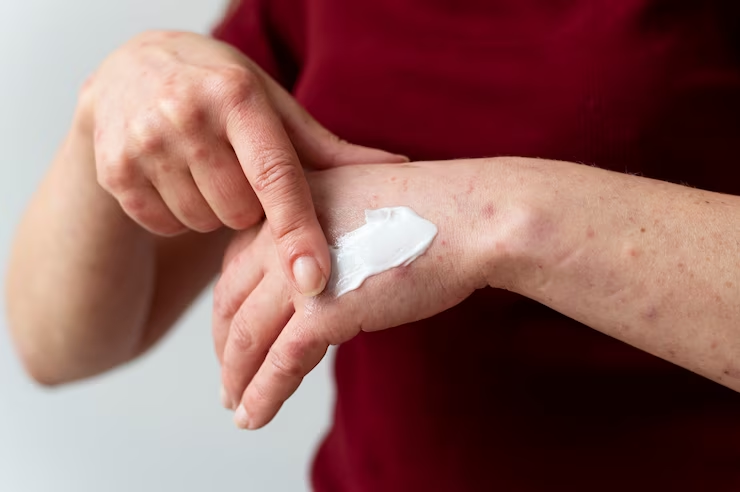
Do you ever experience that unbearable, relentless itchiness after shaving? You're not alone. Itchy skin after shaving is a common concern that many men face. Whether it's your face, neck, or any other area you groom, that post-shave itch can be a real annoyance. We understand how frustrating and uncomfortable it can be when your skin feels irritated and itchy after a shave.
But fret not, for you're not alone in this struggle. In this article, we'll delve into the causes of itchy skin after shaving and provide practical tips and remedies specifically tailored to help men like you find relief. So, if you're tired of dealing with the aftermath of shaving-induced itchiness, keep reading to discover how to achieve smooth, irritation-free skin without the incessant itch.
Understanding Itchy Skin
What is Itchy Skin?
Itchy skin, medically known as pruritus, refers to a sensation on the skin that triggers the desire to scratch or rub the affected area. It is a common symptom that can occur due to various underlying causes. Itchy skin can range from mild to severe and can be localized to a specific area or affect the entire body.
The sensation of itchiness is often accompanied by an urge to scratch, which can provide temporary relief but may also lead to further irritation and potential skin damage. Itchy skin can occur on any part of the body and can be caused by external factors, such as insect bites or irritants, as well as internal factors, such as skin conditions, allergies, or systemic diseases.
Causes of Itchy Skin After Shaving

Itchy skin after shaving can be an annoying and uncomfortable sensation that many people can relate to. While it is a common issue, understanding the causes of itchy skin after shaving is essential in finding effective solutions and prevention strategies.
Dryness and Lack of Moisture
Shaving can remove not only unwanted hair but also the natural oils that keep the skin moisturized. This can lead to dryness, tightness, and a compromised skin barrier. Dry skin is more prone to itching as it lacks the necessary moisture and protective barrier to keep it hydrated and healthy.
Irritation from Razor Burn
Razor burn occurs when the razor blade scrapes against the skin during shaving, causing irritation and inflammation. This can result from using a dull blade, applying excessive pressure, or going over the same area repeatedly. Razor burn can manifest as redness, tenderness, small bumps, and itchiness. The damaged skin becomes more sensitive and susceptible to itching.
Ingrown Hairs
Ingrown hairs occur when shaved hair grows back into the skin instead of outward. This can happen when hair follicles become clogged or when hair is cut too closely to the skin's surface. Ingrown hairs can cause red, inflamed bumps that are often itchy. When the hair is trapped beneath the skin, it can lead to irritation and discomfort. This usually happens when men shave their hair in the opposite direction.
Allergic Reactions to Shaving Products
Some individuals may have allergies or sensitivities to certain ingredients commonly found in shaving creams, gels, or aftershave products. Fragrances, preservatives, and other chemical compounds can trigger an allergic reaction, resulting in itching, redness, swelling, or a rash. Identifying and avoiding these allergens is crucial to preventing itchy skin after shaving.
Allergic Reactions to Shaving Materials
While rare, some individuals may have an allergic reaction to the metal or other materials used in razors. This can cause localized itching, redness, and irritation on the areas of the skin that come into contact with the razor. Switching to hypoallergenic or alternative shaving materials may be necessary in such cases.
By understanding these underlying causes, you can take appropriate measures to address them and minimize the risk of itchy skin after shaving. This may include adopting proper shaving techniques, using suitable shaving products for your skin type, and being mindful of any potential allergens or irritants.
Factors That Worsen Itchy Skin After Shaving
When it comes to dealing with itchy skin after shaving, it's important to be aware of certain factors that can exacerbate the itching and discomfort. By understanding these factors, you can take proactive steps to minimize their impact and find relief. Here are some key factors that can worsen itching:

Dryness and Lack of Moisture
Dry skin is more prone to itching. After shaving, the skin's natural oils can be stripped away, leading to dryness and further exacerbating the itching sensation. Environmental factors such as low humidity or excessive heat can also contribute to dryness and worsen itching.
Friction and Irritation
Shaving itself involves the physical act of dragging a razor across the skin, causing friction. If the razor is dull, if too much pressure is applied, or if multiple passes are made over the same area, it can lead to irritation and heightened itching. Additionally, using rough or abrasive materials on the skin, such as rough towels or loofahs, can further irritate the skin and intensify the itching.
Harsh Chemicals and Fragrances
Some shaving products, such as creams, gels, or aftershaves, may contain harsh chemicals or fragrances that can irritate the skin and trigger itching. Certain ingredients, such as alcohol or menthol, may have a drying effect on the skin, worsening the itchiness. It's important to be mindful of the products you use and opt for gentler, fragrance-free options if you have sensitive skin.
Poor Aftercare
Neglecting proper post-shave care can prolong and intensify itching. Failing to moisturize the skin adequately or using products that contain irritants can further dry out the skin and exacerbate the itchiness. It's crucial to soothe and nourish the skin after shaving to promote healing and prevent excessive itching.
Symptoms and Diagnosis
Is your skin itchy after shaving? If so, you're likely familiar with the uncomfortable sensation that can follow a shaving session. Understanding the symptoms associated with itchy skin after shaving is essential for proper diagnosis and effective treatment.
Skin Itchiness:
The most prominent symptom of itchy skin after shaving is a persistent itchiness in the areas where shaving has occurred. This itching sensation can vary in intensity and may be accompanied by a strong urge to scratch the affected skin. The itchiness is typically localized to the shaved areas, such as the face, legs, underarms, or bikini area.Redness and Inflammation
: Itchy skin after shaving can also be accompanied by redness and inflammation. The skin may appear visibly irritated, with a reddish hue and a warm or hot sensation. This can be indicative of razor burn, which is caused by the friction of the razor against the skin during shaving.Bumps or Rash:
In some cases, itchy skin after shaving may result in the development of small bumps or a rash. These bumps can be raised and may contain pus in the case of infected ingrown hairs. The presence of bumps or a rash can be a sign of irritation or an allergic reaction to shaving products or materials.Discomfort and Irritation
: Itchy skin after shaving can cause significant discomfort and irritation. The constant itchiness and the urge to scratch can disrupt daily activities and lead to skin sensitivity. The affected area may feel tender, and scratching can potentially worsen the irritation.Treating Itchy Skin After Shaving

General self-care measures
Proper Hydration and Moisturization: Keeping your skin well-hydrated is crucial in reducing itchiness. Drink an adequate amount of water daily to maintain overall hydration. Additionally, apply a moisturizer to your skin regularly, especially after bathing or showering. Look for moisturizers that are fragrance-free and contain ingredients like ceramides or hyaluronic acid, which help lock in moisture and soothe dry, itchy skin.Avoiding Triggers and Irritants
: Identify any triggers or irritants that may be causing or exacerbating your itchy skin. Common irritants include certain fabrics, harsh chemicals, or specific skincare products. Try to avoid these triggers as much as possible and opt for gentle, hypoallergenic products that are suitable for sensitive skin.Using Mild Soaps and Detergents
: Harsh soaps and detergents can strip the skin of its natural oils and further contribute to dryness and itchiness. Use mild, fragrance-free soaps and detergents that are specifically formulated for sensitive skin. Avoid scrubbing the skin vigorously and opt for gentle cleansing techniques.Wearing Loose-Fitting Clothing
: Tight-fitting clothing can cause friction and irritation, leading to increased itchiness. Opt for loose-fitting, breathable clothing made from natural fibers like cotton. This allows air to circulate around the skin and reduces the likelihood of irritation.Over-the-counter remedies

Over-the-counter remedies can be helpful in providing relief from itchy skin after shaving. These remedies are easily accessible and can be used for mild to moderate cases of itching. Consider the following over-the-counter options:
Antihistamines
: Antihistamines are commonly used to relieve itching caused by allergies. They work by blocking the action of histamine, a chemical released during an allergic reaction that can trigger itchiness. Over-the-counter oral antihistamines, such as cetirizine or loratadine, can help alleviate itching associated with allergic reactions or insect bites. Follow the recommended dosage instructions on the packaging and consult a healthcare professional if you have any underlying medical conditions or are taking other medications. It is always better to consult your doctor preferably a skin specialist before taking any medication.Topical Creams and Ointments
: Over-the-counter topical creams and ointments can provide temporary relief from itchy skin. These products often contain ingredients such as hydrocortisone, which has anti-inflammatory properties and can reduce itching and redness. Apply the cream or ointment directly to the affected area according to the instructions provided. It's important to note that prolonged use of topical corticosteroids should be avoided without consulting a healthcare professional, as it can lead to skin thinning or other side effects. Since hydrocortisone is a steroid, it should be applied after consulting with a dermatologist because it can worsen some conditions as well such as acne.Prescription treatments
In cases where over-the-counter remedies and self-care measures are not providing sufficient relief for itchy skin, healthcare professionals may prescribe stronger treatments. These prescription options can effectively address more severe or persistent itching. Consider the following prescription treatments:
Prescription-Strength Creams and Ointments
: Dermatologists may prescribe topical creams or ointments that contain stronger concentrations of active ingredients, such as corticosteroids or calcineurin inhibitors. These medications work to reduce inflammation, relieve itching, and promote healing of the skin. They are typically prescribed for specific skin conditions, such as eczema, psoriasis, or allergic reactions. It's important to follow the prescribed usage instructions and consult your healthcare professional regarding the duration and application of these prescription-strength products.Oral Medications:
In certain cases, oral medications may be prescribed to help manage severe itching. Antihistamines, such as hydroxyzine or fexofenadine, may be prescribed to control allergic reactions that cause itching. In some instances, medications that target the immune system, such as cyclosporine or methotrexate, may be prescribed for chronic skin conditions with intense itching, like severe eczema or psoriasis. These medications require close monitoring and should only be taken under the supervision of a dermatologist.Alternative and complementary therapies

Alternative and complementary therapies can be considered as additional options for managing itchy skin after shaving. While scientific evidence may vary for these approaches, some individuals find them helpful in relieving itching and promoting overall skin health. Explore the following alternative and complementary therapies:
Natural Remedies:
Various natural remedies can provide relief from itchy skin after shaving. Oatmeal baths, for example, can help soothe irritated skin. Add colloidal oatmeal to lukewarm bath water and soak for 15-20 minutes to alleviate itching. Cold compresses can also be applied to the affected area to provide temporary relief by numbing the skin and reducing inflammation. However, it's important to note that natural remedies may not work for everyone, and it's advisable to consult a healthcare professional for personalized advice.Acupuncture
: Acupuncture, an ancient Chinese practice, involves inserting thin needles into specific points of the body. Some individuals report that acupuncture helps relieve itching by promoting better circulation and balancing the body's energy. If considering acupuncture, it's crucial to seek treatment from a qualified and licensed acupuncturist.Herbal Supplements:
Certain herbal supplements are believed to have anti-inflammatory and soothing properties that can alleviate itchy skin. Examples include chamomile, calendula, and aloe vera. However, it's important to exercise caution when using herbal supplements, as they can interact with medications or have adverse effects in some individuals. Consult a healthcare professional or herbalist before incorporating herbal supplements into your routine.Preventing Itchy Skin
To minimize the occurrence of getting your skin itchy after shaving, incorporating preventive measures into your skincare routine can make a significant difference. By following these guidelines, you can promote healthier skin and reduce the likelihood of post-shave itchiness:
Maintaining Good Skin Hygiene
: Proper skin hygiene is essential in preventing itching after shaving. Ensure that you clean your skin gently but thoroughly before and after shaving. Use a mild cleanser or hypoallergenic soap to remove any dirt, sweat, or bacteria that could potentially irritate the skin. Avoid using hot water, as it can strip the skin of its natural oils and lead to dryness and itchiness.Moisturizing Regularly
: Keeping your skin well-hydrated is crucial in preventing dryness and itchiness after shaving. Apply a moisturizer to your skin daily, focusing on the shaved areas. Look for moisturizers that are fragrance-free and specifically formulated for sensitive or post-shave skin. Moisturizers with soothing ingredients like aloe vera or chamomile can provide additional relief and hydration.Avoiding Triggers and Irritants
: Identify and avoid triggers and irritants that can worsen itchiness after shaving. Harsh soaps, scented products, and abrasive materials can irritate the skin. Opt for mild, fragrance-free cleansers, and shaving creams or gels that are suitable for sensitive skin. Additionally, avoid using products that contain alcohol or other drying ingredients, as they can contribute to post-shave dryness and itchiness.Protecting the Skin from Extreme Weather Conditions:
Extreme weather conditions, such as cold, dry air or excessive heat, can exacerbate post-shave itchiness. Protect your skin by wearing appropriate clothing to shield it from harsh elements. In colder weather, use a scarf or clothing to cover the shaved areas. In hotter weather, stay hydrated and seek shade to avoid excessive sweating, which can further irritate the skin.Managing Stress and Anxiety:
Stress and anxiety can contribute to skin sensitivities and itchiness. Practice stress management techniques such as exercise, meditation, deep breathing, or engaging in activities you enjoy. Taking steps to reduce stress levels can help improve overall skin health and reduce the likelihood of post-shave itchiness.When to Consult a Healthcare Professional

Experiencing itchy skin after shaving is a common occurrence for many individuals, and in most cases, it can be managed with home remedies and lifestyle adjustments. However, there are instances where it may be necessary to consult a healthcare professional, especially when the itching persists or is accompanied by certain symptoms. Here are some situations in which seeking medical advice is recommended:
Severe or Prolonged Itching
: If the itching after shaving is severe, persistent, or continues to worsen despite trying various remedies, it may be a sign of an underlying skin condition or infection. A healthcare professional can assess your symptoms, conduct a thorough examination, and provide appropriate treatment options.Presence of Infection
: If you notice signs of infection, such as increased redness, swelling, pus-filled bumps, or a spreading rash, it is crucial to seek medical attention. These symptoms could indicate a bacterial or fungal infection, requiring specific medications or interventions.Allergic Reactions
: If you experience an allergic reaction, such as severe itching, swelling, difficulty breathing, or a widespread rash, it is essential to consult a healthcare professional immediately. Allergic reactions can be serious and may require prompt medical intervention.Frequent Ingrown Hairs
: If you frequently develop ingrown hairs after shaving, resulting in persistent itching and discomfort, a healthcare professional can provide guidance on preventing and managing them. They may recommend alternative hair removal methods or prescribe medications to address the issue.Chronic Skin Conditions:
If you have a pre-existing skin condition, such as eczema, psoriasis, or dermatitis, and the itching worsens after shaving, it is advisable to consult a healthcare professional. They can evaluate the interaction between your skin condition and shaving and provide personalized recommendations for managing the itchiness.Remember, healthcare professionals are trained to diagnose and treat various skin conditions, and seeking their expertise can provide valuable insights and peace of mind.
Diagnostic Methods and Tests
When dealing with persistent or severe itchy skin after shaving, diagnostic methods and tests may be utilized by healthcare professionals to determine the underlying cause. Here are some methods and tests that healthcare professionals may employ:
Physical Examination
: A dermatologist will conduct a thorough physical examination of the affected area. They will assess the skin for signs of redness, inflammation, bumps, or other abnormalities. This examination helps determine the severity of the itchiness and provides insights into potential causes, such as razor burn, ingrown hairs, or allergic reactions.Review of Medical History
: Providing your healthcare professional with a detailed medical history, including any previous skin conditions or allergies, can be valuable in identifying potential triggers for the itchy skin. Information about your shaving routine, the products you use, and any recent changes can help pinpoint the underlying cause.Allergy Testing
: If an allergic reaction is suspected as the cause of the itchy skin after shaving, allergy testing may be recommended. This can involve patch testing, where small amounts of common allergens are applied to the skin to observe any reactions. Allergy testing helps identify specific substances or ingredients that may be triggering the itching.Microscopic Examination
: In cases where ingrown hairs or infections are suspected, a healthcare professional may conduct a microscopic examination. They will examine the affected area under a microscope to identify any signs of infection, such as bacteria or fungi, or to assess the presence of ingrown hairs.Biopsy
: In rare cases where a more serious underlying condition is suspected, a skin biopsy may be performed. This involves taking a small sample of skin tissue for laboratory analysis. A biopsy can help diagnose conditions such as dermatitis, psoriasis, or other skin disorders that may contribute to the itchy skin after shaving.It's important to note that the diagnostic methods and tests used will depend on the individual case and the healthcare professional's judgment. They will consider the specific symptoms, medical history, and severity of the itchy skin to determine the most appropriate diagnostic approach.
Conclusion
Itchy skin after shaving is a common concern that many individuals experience. The discomfort and irritation can disrupt daily routines and affect overall well-being. Understanding the causes of itchy skin after shaving and implementing appropriate treatment and preventive measures are key to finding relief and promoting healthier skin. A qualified skin specialist can always guide you in the best possible way and manage you specifically according to your requirements, therefore, never shy away from visiting a dermatologist at any stage.


